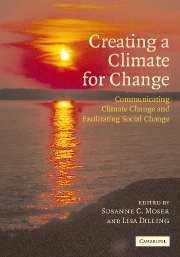Book contents
- Frontmatter
- Contents
- Preface
- Foreword
- List of contributors
- List of tables
- List of figures
- List of text boxes
- Introduction
- Part I Communicating climate change
- 1 Weather or climate change?
- 2 Communicating the risks of global warming: American risk perceptions, affective images, and interpretive communities
- 3 More bad news: the risk of neglecting emotional responses to climate change information
- 4 Public scares: changing the issue culture
- 5 The challenge of trying to make a difference using media messages
- 6 Listening to the audience: San Diego hones its communication strategy by soliciting residents' views
- 7 The climate-justice link: communicating risk with low-income and minority audiences
- 8 Postcards from the (not so) frozen North: talking about climate change in Alaska
- 9 Climate change: a moral issue
- 10 Einstein, Roosevelt, and the atom bomb: lessons learned for scientists communicating climate change
- 11 Across the great divide: supporting scientists as effective messengers in the public sphere
- 12 Dealing with climate change contrarians
- 13 A role for dialogue in communication about climate change
- 14 Information is not enough
- Part II Facilitating social change
- Part III Creating a climate for change
- About the authors
- Index
- References
5 - The challenge of trying to make a difference using media messages
Published online by Cambridge University Press: 20 August 2009
- Frontmatter
- Contents
- Preface
- Foreword
- List of contributors
- List of tables
- List of figures
- List of text boxes
- Introduction
- Part I Communicating climate change
- 1 Weather or climate change?
- 2 Communicating the risks of global warming: American risk perceptions, affective images, and interpretive communities
- 3 More bad news: the risk of neglecting emotional responses to climate change information
- 4 Public scares: changing the issue culture
- 5 The challenge of trying to make a difference using media messages
- 6 Listening to the audience: San Diego hones its communication strategy by soliciting residents' views
- 7 The climate-justice link: communicating risk with low-income and minority audiences
- 8 Postcards from the (not so) frozen North: talking about climate change in Alaska
- 9 Climate change: a moral issue
- 10 Einstein, Roosevelt, and the atom bomb: lessons learned for scientists communicating climate change
- 11 Across the great divide: supporting scientists as effective messengers in the public sphere
- 12 Dealing with climate change contrarians
- 13 A role for dialogue in communication about climate change
- 14 Information is not enough
- Part II Facilitating social change
- Part III Creating a climate for change
- About the authors
- Index
- References
Summary
When social problems erupt, one classic response of governments and organizations is to wade in with an information campaign. From automobile seat belts to AIDS to recycling, policy-makers wage war on our inappropriate behaviors with newspaper stories, brochures, and public service announcements.
The goals are often noble ones, the dollars spent gargantuan, and the outcomes all too predictable: Messages seem to change the behaviors of some people some of the time but have almost no discernible impact on most people most of the time (McGuire, 1986; Hornik, 1989).
The situation has so discouraged policy-makers in the past that the pattern was given its own, dismal label: minimal effects (for perhaps the earliest articulation of this name, see Lazarsfeld, Berelson, and Gaudet, 1944). If media messages have no impact, policy-makers opined, why bother?
Today's communication scholars would agree with yesterday's policy-makers that media messages are often poor catalysts for behavior change, but many would disagree with that “minimal effects” label. Mediated messages can have pronounced effects, they would suggest, just not the ones envisioned by those who design them.
As countries around the globe face the prospect of encouraging massive behavior changes in order to try to prevent or, at the least, cope with climate change, it will be tempting to resort to information campaigns. I would urge us to succumb to that temptation; after all, media campaigns offer dramatic economies of scale by reaching large audiences at relatively low cost with potentially useful information.
Information
- Type
- Chapter
- Information
- Creating a Climate for ChangeCommunicating Climate Change and Facilitating Social Change, pp. 89 - 104Publisher: Cambridge University PressPrint publication year: 2007
References
Accessibility standard: Unknown
Why this information is here
This section outlines the accessibility features of this content - including support for screen readers, full keyboard navigation and high-contrast display options. This may not be relevant for you.Accessibility Information
- 31
- Cited by
